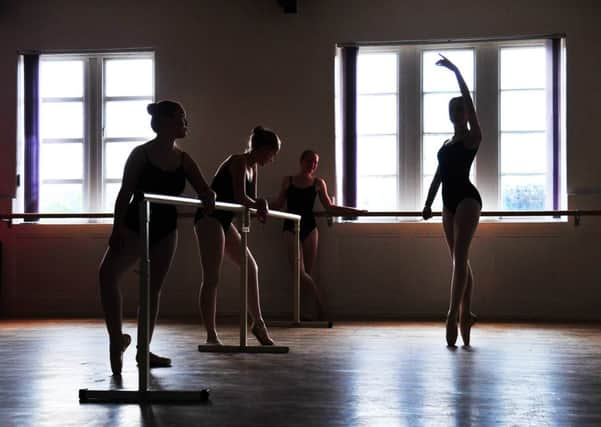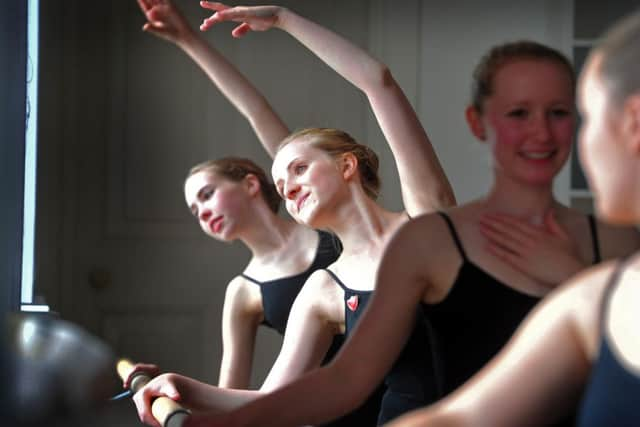Steps in time: Realising the dream


“I owe Margaret Allenby Jaffe absolutely everything, I will always be grateful for what she did for me,” says David Gayle, the man applauded as one of the finest and most influential ballet dancers to come out of Yorkshire.
His achievements are both trailblazing as well as breathtaking; after graduating from the Royal Ballet School he performed alongside Rudolf Nureyev and Dame Margot Fonteyn as part of the Royal Ballet Company.
Advertisement
Hide AdAdvertisement
Hide AdWhilst still a young dancer David had the honour of becoming the first male to be accepted onto the Royal Ballet School’s teacher training programme. As a teacher, he established the now internationally renowned Yorkshire Ballet Seminars, which offer talented ballet dancers from Yorkshire the opportunity to train with some of the world’s greatest dancers and teachers. The success of the seminars then afforded David his greatest accolade, that being an invitation to set up and start the Royal Ballet’s first ever summer school at White Lodge in Richmond Park.


However it’s the story that precedes the one of his success which David emphasises is the most important one.
“My story is like a Billy Elliot story in a way....as a child I had spent six years with another dance teacher in my home town of Ilkley, and although I loved to dance and thought I was wonderful at it, I had failed my grade one. I was coming up to 15, on the verge of leaving school, and felt the career I wanted as a dancer was no longer possible. My mother then heard about a dance school in Skipton – and she dragged me along.”
The school was run by Margaret Dixon Phillip, later Allenby Jaffe, and both she and it were a revelation.
Advertisement
Hide AdAdvertisement
Hide Ad“I was amazed; I couldn’t believe the standard of the pupils there. Margaret told me and mother that I could be a dancer, but I would have to attend every single day, which I did for two years, attending classes from 2pm to 9.30pm every weekday and then again on Saturday mornings. With her tutelage I achieved all my grades, and then when I was 16 she took me to audition at the Royal Ballet School who offered me a place immediately.
“The point is Margaret could have said it was too late for me, but she didn’t. She saw I had talent, and although it was a challenge and a lot of hard work for both of us, she believed in me which is something I will never forget.”
David’s is a fascinating story, and not unlike that of another of Margaret’s former pupils, Elizabeth Richards, who was her very first pupil to embark on a professional career in 1957, going onto dance at Sadler’s Wells as part of the Handel Opera Society, before joining the Laban Art of Movement Centre.
“I first met Margaret in 1952 when I was 15 years old. This was post war England and people had started to have dreams. My dream was to be a dancer, and Margaret saw a potential in me that I could not see for myself. I will always be immensely grateful to her, as without her I would not have had such as full and rewarding life.”
Advertisement
Hide AdAdvertisement
Hide AdWhen Elizabeth started to visit Margaret for dance lessons, it was the early days of Margaret’s teaching career, where she taught under her maiden name, the school being called the Dixon-Phillip Stage School. In these early days classes were held in village halls around the Dales.
“I remember Margaret once spoke to me of her dream, which was to have a studio, and ultimately to have an actual ballet school.” reveals Elizabeth, “she had the courage and determination to make both a reality.”
Indeed Margaret’s first studio and her eventual dance school, Northern Dance Centre, did become a reality, but over the last 66 years, their reputation and the thousands of students who have passed through them, and the hundreds of professional careers which have been launched, have transformed Margaret’s life work into something which transcends her material achievements. It is a legacy which has in fact earned her the Imperial Award for Dance in 1999, and in this, her 91st year, a British Empire Medal.
Margaret’s story within the world of dance began in the war years. Whilst working for the Northern Command Voluntary Entertainments Services she formed a student theatre group. The brief was to provide song and dance shows for the troops who were of differing nationalities and stationed all over the north of England. This engagement with dance and with people from all over Europe was catalytic for Margaret, and sparked not only a love of dance, but a lifelong passion for folk dance. Margaret taught music after the war to fund her dance teacher training, travelling weekly to Manchester to learn under the celebrated dance teacher Mary Archbutt, and once qualified she set about realising her dreams.
Advertisement
Hide AdAdvertisement
Hide AdNorthern Dance Centre and Northern Lights Theatre Group are the most tangible legacies of Margaret’s career, and since she retired – officially seven years ago, former pupils, sisters Amy Addison and Lucy Kaupe have been running the school.
“After qualifying from Laine Theatre Arts in Kent I taught at various places, eventually coming back to teach for Margaret in 1996,” explains Amy, “Margaret officially retired in 2007 and that is when I took over, but the reality was that she kept on teaching for another four years. She finally had to stop for health reasons just three years ago when she was 88, however she still is and always has been there for us. I think we are still growing into being in charge of the school – they are huge shoes to fill.”
Although Amy confesses to not having had time to write any kind of business plan, it certainly seems that the sisters are continuing the great work which Margaret started all those years ago. Since they took over the directorship, the school’s numbers have swollen to 500 students who attend across a variety of classes throughout the week.
“Ballet and folk dance are still the core of the school, but we have grown the subjects to include tap, jazz, street dance, drama and musical theatre, which gives children more entry points into the world of dance.”
Advertisement
Hide AdAdvertisement
Hide AdAnother triumph which the sisters have affected, is in returning Northern Dance Centre to its spiritual home, Craven Hall in Skipton.
“Craven Hall is ‘the home’ of Northern Dance Centre. Margaret acquired Craven Hall in 1960, staying there until 1987, when the rent became untenable – it was a very difficult decision for her to give up her school’s precious home. When we took over in 2007, our first mission was to find roots for the school, as the logistics of holding so many classes all over town was becoming a struggle. Having looked at countless properties, it was a marvellous surprise to find out that Craven Hall was finally available again. It’s wonderful to be back here, it really is the true home of the school.”
The other part of Margaret’s legacy which the sisters are utterly passionate about, is Margaret’s devotion to the importance of teaching students folk dance. “Margaret is supreme in her class both as a teacher and an examiner, but it’s her knowledge of folk dance and the way she taught it that really sets her apart. Margaret and her husband Nigel travelled all over Europe researching dances, and it’s that first-hand experience of who she’s met and who she’s talked to that makes the dances make so much sense,” smiles Amy. “And like Margaret, we run the folk dance classes for free – these dances are fundamental to all dance, so we want as many of our students as possible to learn and experience them.”
Students from the Folk Dance Studies classes, can be selected to join the school’s Northern Lights Theatre Company, which offers them the amazing opportunity of dancing and competing across many different countries in Europe. The group have represented England at the World Folk Dance Festival in Palma, Mallorca on several occasions, being awarded silver medal in 2005.
Advertisement
Hide AdAdvertisement
Hide AdMargaret’s achievements are immense, yet for all her former students the gift that she gave them was something much quieter: kindness, friendship and an absolute belief in them and their potential. “There was never any ‘queen bee’ with Margaret,” says Amy, “She never was, and she certainly never allowed her students to become so. She never ran a competition school despite achieving the most exceptional results. It’s these qualities that made her and the school so special, and this is definitely something I intend to emulate.”
• www.northerndancecentre.com